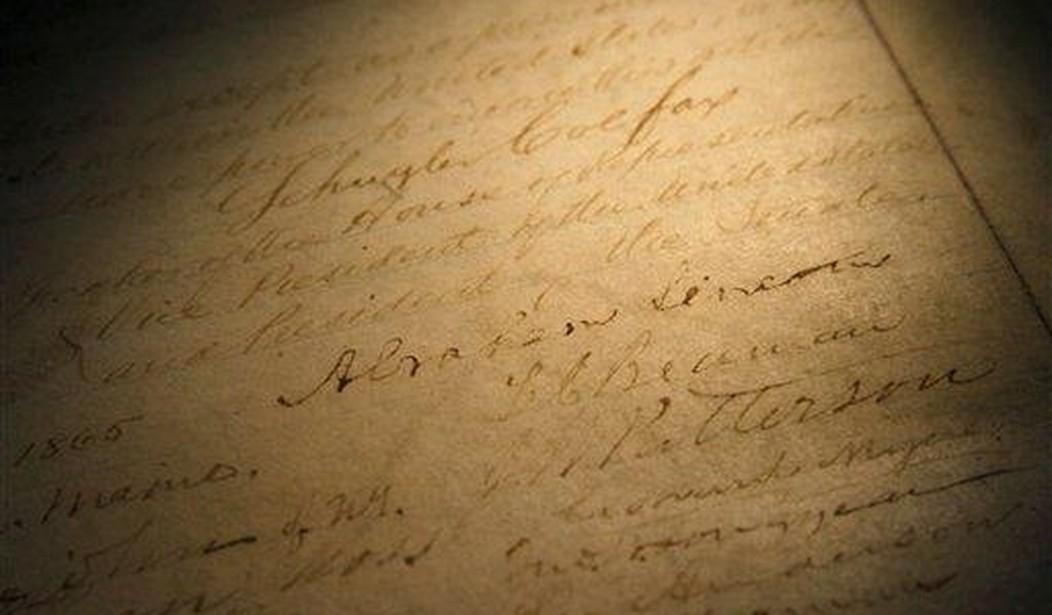Today is the relatively new federal holiday of Juneteenth. But if we really want to celebrate a day on which a historic event occurred aimed at ending institutionalized racism and slavery and enshrining civil rights, we shouldn’t be celebrating Juneteenth. The holiday should be December 6, the day the 13th Amendment was ratified in 1865, or February 3, the day the 15th Amendment was ratified in 1870.
The holidays we celebrate matter very much, as does what each holiday commemorates. June 19 was not a pivotal point in the history of civil rights or constitutional understanding in America. It only “marks the day when federal troops arrived in Galveston, Texas in 1865 to take control of the state and ensure that all enslaved people be freed.” Obviously, this was a joyous event, but it was a step in implementing the earth-shaking, nation-shaping action that had already been taken, namely, the end of slavery. As it is, the nature of Juneteenth is that it allows Democrats to blather about the injustices of slavery and racism without ever addressing the fact that it was the Democrat Party that championed and started a Civil War over slavery, that it was the Democrat Party that strenuously fought against civil rights, and that it was the Republican Party that ended slavery and secured black Americans’ civil rights. Celebrating the Constitutional amendments’ ratifications would not only shed light on the true political history but also teach Americans to understand and love our foundational document.
We don’t celebrate the day the British and Americans signed a treaty ensuring American independence as a national holiday — we celebrate July 4, the day in 1776 when America declared independence, the day the great work of separating from Great Britain began. Likewise, Americans celebrate the birthdays of great men like George Washington and Abraham Lincoln rather than those heroes’ death days. The same should hold true in this case. I am not objecting to a holiday celebrating the end of slavery and the civil rights movement — indeed, neither Democrats nor Republicans are nearly willing enough to canvass and address the true history of slavery and civil rights nor identify the heroes and the villains accurately. But, again, Juneteenth is not the crucial day, not the defining moment, not the history-shattering event.
I sometimes wonder if Democrats, in particular, are enthusiastic about Juneteenth because it marks the date of a rare instance of a Democrat politician — President Andrew Johnson, who was otherwise intensely racist — allowing an anti-slavery action. Indeed, the president in office when Juneteenth happened, Johnson, infamously wrote, “This is a country for white men, and by God, as long as I am President, it shall be a government for white men.”
A former and proud slave-owner and a Democrat with all the racial prejudices that automatically came along with that political affiliation at the time, Johnson opposed full equality for black Americans, even though free blacks had originally been possessed of all federal rights at the time the Constitution was first ratified. Johnson deliberately sabotaged Union leaders’ dream of “40 acres and a mule” for former slaves, he vetoed the Civil Rights Act, and his public statements of condescending charity to the former slaves merely put a veneer over his true racial bigotry.
Related: ‘Star Spangled Banner’: Flag Day and the U.S. Army’s Birthday
The president who wrote the Emancipation Proclamation and pushed the 13th Amendment through Congress was a Republican (Abraham Lincoln), and the party that ultimately ensured the ratification of the 13th Amendment was the Republican Party. Only eight Democrat senators and 16 Democrat congressmen voted to pass the 13th Amendment. The 15th Amendment, which gave black Americans the right to vote and be considered full citizens (as originally they had when the Constitution was ratified), was the special project of Republican President U.S. Grant. It was passed by Republicans with not a single Democrat’s vote in favor. Democrats are erasing and rewriting the true history of anti-slavery achievements to make themselves look good, and Juneteenth is part of that.
Johnson did not allow troops to go into Texas because he passionately wanted to hasten the end of slavery or increase the rights of black Americans, but because he saw emancipation as politically and militarily expedient for him and his allies. Johnson was a disgusting racist, as the majority of his fellow Democrats have always been and continue to be to this day.
If there is one president whose actions we should celebrate, it is not Andrew Johnson. I am all for having a national holiday to celebrate an important event in American history that once again set us on the path to staying true to our founding principles. But let it celebrate Lincoln, the president who was assassinated because he supported civil rights, or U.S. Grant, arguably the greatest civil rights president in American history, not the president who believed that whites must always be considered “superior” to blacks.










Join the conversation as a VIP Member